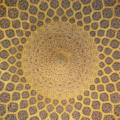Non-dualism has become an increasingly popular spiritual idea in the West, but long before it bumped up against our shores it has been known in India as Advaita Vedanta.
A Single Consciousness
So, just what is Advaita Vedanta, or non-dualism? Essentially, it’s the belief that all souls exist within a single universal consciousness. In other words, what we view as God is not distinct or separate from humankind, nor is God separate from the world. Rather, everything emanates from God, and therefore, consists of God.
In the Internet Encyclopedia of Philosophy, their article on Advaita declares that, ”The experiencing self (which would be us) and the transcendental self of the Universe (which would be God) are in reality identical, though the individual self seems different as space within a container seems different from space as such.”
Once the larger reality of God is known, therefore, our concept of not only the world but of our separate identity collapses. In this newly enlightened state, in which our blinders have shattered at our feet, the universe is no longer the universe, the individual is no longer an individual. All is one Consciousness.
Reincarnation
A second belief that stems from India, but is increasingly gaining a foothold in the West is that of reincarnation. According to it, humankind is trapped in an endless cycle of births and deaths. Eventually, the individual soul tires of the game, and begins to re-orient itself toward God rather than the physical. After many lifetimes, the happy day finally arrives in which the individual breaks through the construct of her own small identity and merges with God, or the One Consciousness.
As the individual identity or ego falls away, as our understanding of ourselves as a separate entity vanishes, as we fully realize and experience ourselves as part of the Universal Consciousness, the physical plane simply has no more relevance for us. The possibility of rebirth vanishes in a puff of smoke, for the individual no longer possesses the desires, drives, aversions, etc. that cling like barnacles to the physical plane in a vain hope for fulfillment.
How to Merge with God
So how do we attain this enlightened state? Do we simply click our heels together a number of times and chant, “I believe, I believe?” Unfortunately, attaining the state of non-dualism is a longer, much more arduous process. It’s a process of laboriously shedding the ego, with all its petty desires and concerns and insecurities, to uncover the divinity within. It generally takes many lives of refining one’s self, and a great deal of self-examination, prayer, meditation, and effort.
So, just to be clear… you don’t have to die to achieve this type of heaven. It’s a state of mind that in turn, engenders a state of being. As www.advaita-vedanta.org puts it, “The non-dual reality is revealed to the intense seeker as an experience, in which to know God is to be God.”
If we are to know God however, if we are to be God, then it follows that we must become more and more like God and less and less like ourselves…until eventually the barrier is so porous, that we float right through it.
But, in the following poem, perhaps the Christian mystic Meister Eckhart described non-dualism best:
When I Was the Forest
When I was the stream, when I was the forest, when I was still the field,
When I was every hoof, foot, fin and wing, when I was the sky itself,
No one ever asked me did I have a purpose,
No one ever wondered was there anything I might need,
For there was nothing I could not love.
It was when I left all we once were that the agony began,
The fear and questions came,
And I wept, I wept.
And tears I had never known before.
So I returned to the river,
I returned to the mountains. I asked for their hand in marriage again,
I begged—I begged to wed every object and creature,
And when they accepted,
God was ever present in my arms. And he did not say, “Where have you been?”
For then I knew my soul—every soul—has always held Him.

